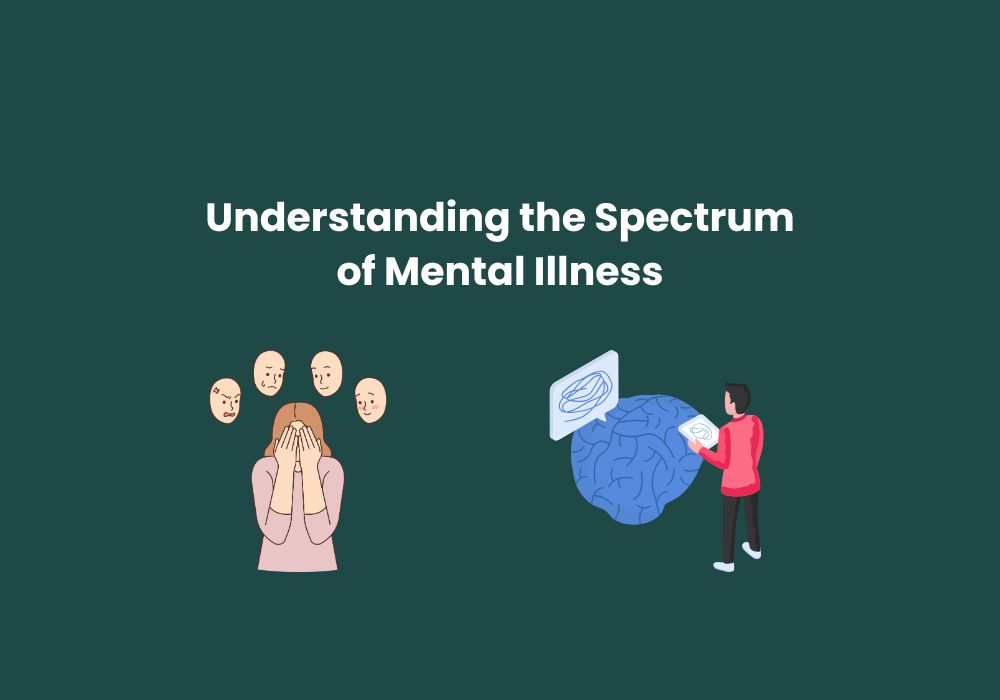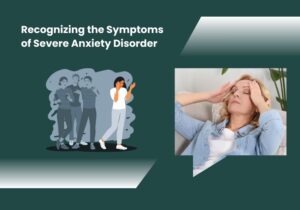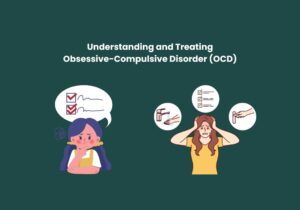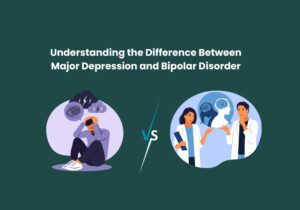Mental illness encompasses a wide range of mental health conditions that affect a person’s mood, thinking, and behavior. These conditions can vary significantly in severity and impact on daily life. Understanding the spectrum of mental illness is crucial for recognizing symptoms, seeking appropriate treatment, and reducing stigma.
Before starting this topic, check out our previous blog post, Symptoms of Depression, and Treatment Options. It’s essential to recognize these key Symptoms of Depression so you can identify them and receive the appropriate help when needed.
Categories of Mental Illness
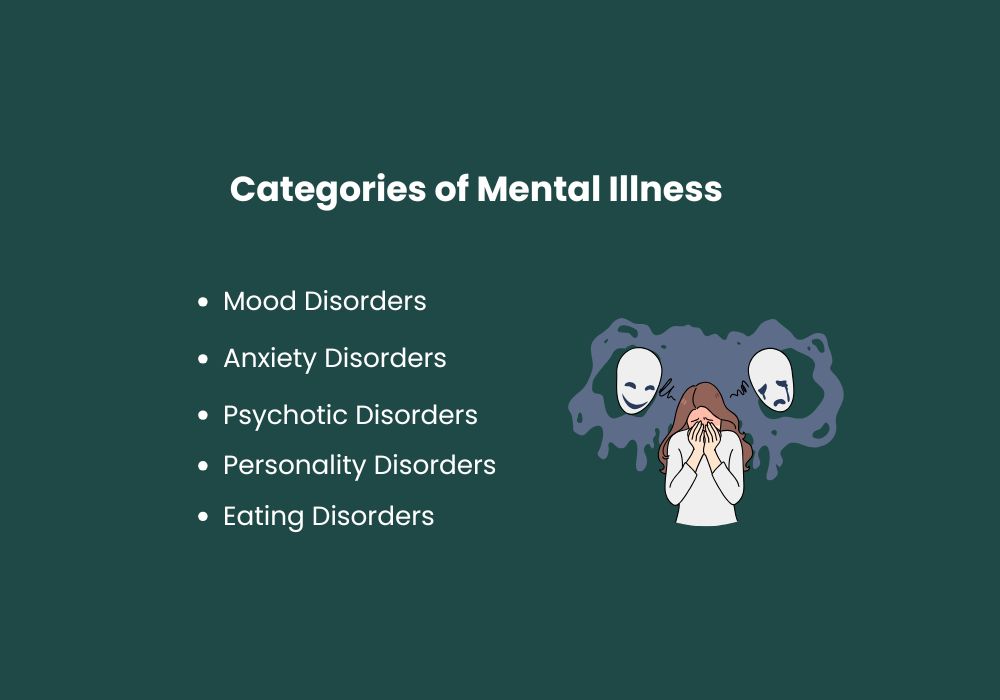
Mood Disorders
- Major Depressive Disorder (MDD): Persistent feelings of sadness and loss of interest in activities.
- Bipolar Disorder: Characterized by extreme mood swings, including manic (high) and depressive (low) episodes.
- Dysthymia (Persistent Depressive Disorder): Chronic, less severe form of depression lasting for at least two years.
Anxiety Disorders
- Generalized Anxiety Disorder (GAD): Excessive, uncontrollable worry about various aspects of life.
- Panic Disorder: Recurrent, unexpected panic attacks and fear of future attacks.
- Social Anxiety Disorder: Intense fear of social situations and being judged by others.
- Phobias: Irrational fear of specific objects or situations, such as heights (acrophobia) or spiders (arachnophobia).
Obsessive-Compulsive and Related Disorders
- Obsessive-Compulsive Disorder (OCD): Persistent, unwanted thoughts (obsessions) and repetitive behaviors (compulsions) performed to alleviate anxiety.
- Body Dysmorphic Disorder (BDD): Preoccupation with perceived flaws in physical appearance.
- Hoarding Disorder: Difficulty discarding possessions, leading to cluttered living spaces.
Trauma and Stressor-Related Disorders
- Post-Traumatic Stress Disorder (PTSD): Persistent mental and emotional stress resulting from a traumatic event.
- Acute Stress Disorder: Similar to PTSD, it occurs immediately after the traumatic event and lasts for a shorter duration.
- Adjustment Disorder: Emotional or behavioral response to a stressful event or change in life.
Psychotic Disorders
- Delusions, hallucinations, disorganized thinking, and impaired functioning characterize schizophrenia.
- Schizoaffective Disorder: A combination of schizophrenia symptoms and mood disorder symptoms (depression or mania).
- Brief Psychotic Disorder: Short-term psychotic symptoms following a stressful event.
Personality Disorders
- Borderline Personality Disorder (BPD): Instability in mood, self-image, and interpersonal relationships.
- Antisocial Personality Disorder: Disregard for the rights of others, lack of empathy, and often criminal behavior.
- Narcissistic Personality Disorder: Grandiosity, need for admiration, and lack of empathy for others.
Eating Disorders
- Anorexia Nervosa: Restriction of food intake leading to significant weight loss and fear of gaining weight.
- Bulimia Nervosa: Recurrent episodes of binge eating followed by compensatory behaviors, such as vomiting or excessive exercise.
- Binge-Eating Disorder: Recurrent episodes of eating large quantities of food without compensatory behaviors.
Substance-Related and Addictive Disorders
- Substance Use Disorders: Dependence on or abuse of substances such as alcohol, drugs, or prescription medications.
- Gambling Disorder: Compulsive gambling behavior leads to significant personal and financial problems.
Treatment Options for Mental Illness
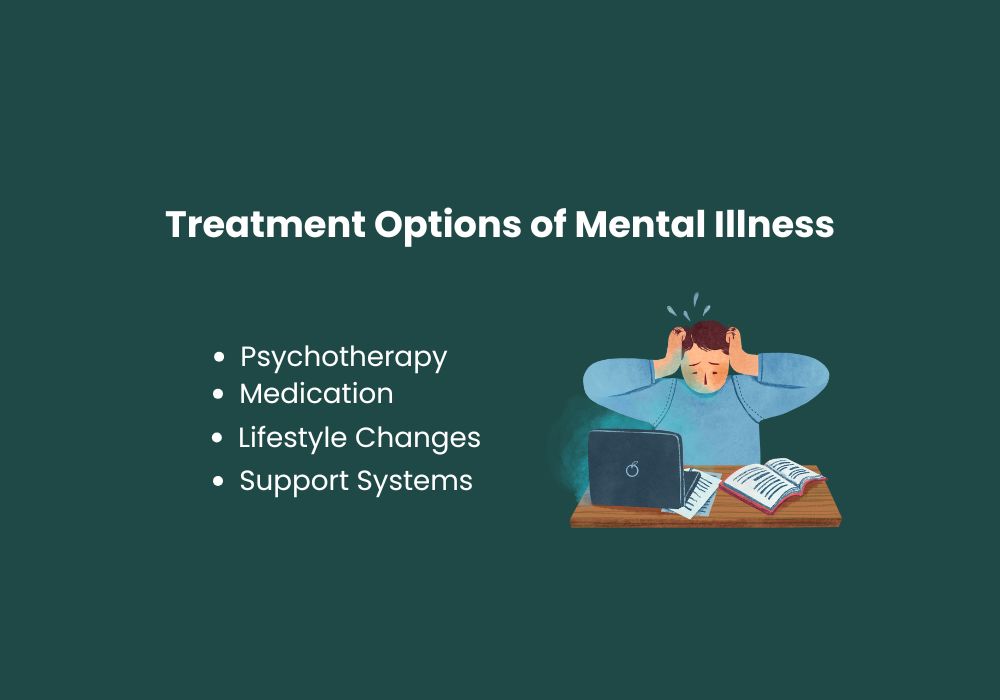
Treatment for mental illness typically involves a combination of therapy, medication, lifestyle changes, and support. The best approach depends on the individual’s specific condition and needs.
1. Psychotherapy
- Cognitive-behavioral therapy (CBT): Focuses on changing negative thought patterns and behaviors.
- Dialectical Behavior Therapy (DBT): Combines CBT with mindfulness techniques, often used for BPD.
- Interpersonal Therapy (IPT): Improves communication skills and relationships.
- Psychodynamic Therapy: Explores underlying emotional conflicts and past experiences.
2. Medication
- Antidepressants: Used for mood and anxiety disorders.
- Antipsychotics: Used for psychotic disorders and severe mood disorders.
- Mood Stabilizers: Used for bipolar disorder.
- Anxiolytics: Used for anxiety disorders.
3. Lifestyle Changes
- Regular Physical Activity: Exercise can improve mood and overall well-being.
- A healthy diet supports mental health.
- Sleep Hygiene: Good sleep practices improve mental health.
- Stress Management: Techniques such as mindfulness and meditation reduce stress.
4. Support Systems
- Support Groups: Provide emotional support and practical advice.
- Family and Friends: Strong support networks offer comfort and encouragement.
- Professional Help: Regular follow-ups with healthcare providers ensure effective treatment.
Frequently Asked Questions (FAQs)
What are some common signs of mental illness?
Mental illnesses can include low mood, excessive worry, behavior changes, sleep issues, or a disconnection from reality (like delusions or hallucinations).
Which mental illnesses are most commonly seen?
The most common ones include: Depression, Anxiety, Bipolar Disorder, OCD, PTSD, and Eating Disorders.
What types of therapy are most effective for mental illness?
Cognitive Behavioral Therapy (CBT), Dialectical Behavior Therapy (DBT), Interpersonal Therapy (IPT), and Psychodynamic Therapy, depending on the type of condition and personal needs.
Do all mental health conditions require medication?
No, not all mental illnesses need medication. In many cases, therapy, lifestyle changes, and strong support are enough to manage symptoms.
When should someone seek professional help for mental health?
If a person is struggling with daily tasks, having emotional outbursts, experiencing thoughts of self-harm, or showing significant changes in behavior, it’s time to get professional help.
Conclusion
Mental illness is a complex and varied spectrum, with each condition requiring specific approaches to treatment and management. Understanding the range of mental health conditions can help individuals recognize symptoms, seek appropriate help, and support others. At Peniel Psychiatry, our dedicated team is committed to providing comprehensive care tailored to each individual’s needs. If you or a loved one is struggling with mental health issues, don’t hesitate to reach out for expert guidance and support on your journey to recovery

